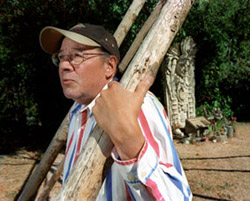|
|
|
Dr. Walter Hollow: Mentor to a Generation of Native American Medical Students
|
|
 |
|
|
Family physician Dr. Walter Hollow at Discovery Park in Seattle.
|
|
|
|
|
|
|
As the first Native American to graduate from the UW School of Medicine, Dr. Walter Hollow, clinical associate professor of family medicine, tread a lonely path. He came close to turning back.
“I almost dropped out,” recalled Hollow, “not because of any academic problems, but because I felt isolated from my Native American culture.”
Hollow, a member of the Assiniboine and Sioux tribes, dealt with his isolation by becoming a founding member of the Seattle Indian Health Board, one of the first clinics in the nation to address urban Indian health needs. Hollow did half of his family practice residency at the clinic. Later he became its first medical director.
To ensure that those who followed in his path wouldn’t face similar isolation, in 1991 Hollow received federal funding for a UW Native American Center of Excellence (NACOE). The center offers a formal Indian Health Pathway within the medical school curriculum backed by a solid mentoring and social support structure. Hollow has personally guided a generation of Native American students through medical school.
“When I finished my residency in 1978, I was the only Native American physician in the five WWAMI states,” said Hollow. “Of the 48 Native American physicians practicing in the region today, probably 45 graduated from the UW. I was their teacher.”
American Indians and Alaska Natives entering the UW School of Medicine find that Hollow has created a welcoming place for them. The NACOE recruits, supports, and retains Native American medical students and faculty. The center also coordinates clinical research on Indian health problems and designs a curriculum to address Indian health needs.
Socially, the Medicine Wheel Society, a group of American Indian alumni, medical and pre-medical students meets monthly. Hollow is the faculty advisor for the group, which he started when he was a student.
The Indian Health Pathway offers courses to Indian and non-Indian medical students, as well as two clerkships. In one clerkship, medical students work on a reservation alongside a traditional Indian healer, who addresses the spiritual and mental health of the sick. Many Indian patients use both traditional Indian healing and western medicine. Physicians who know how best to collaborate with healers can benefit these patients.
Most medical students taking the pathway are themselves Indian and almost all choose a family practice serving Indian people.
In 2001, the National Medical Fellowships, which back in the 1970s had given the scholarship that put Hollow through medical school, presented him with a Community Service Award for his work with Native American medical students.
|












